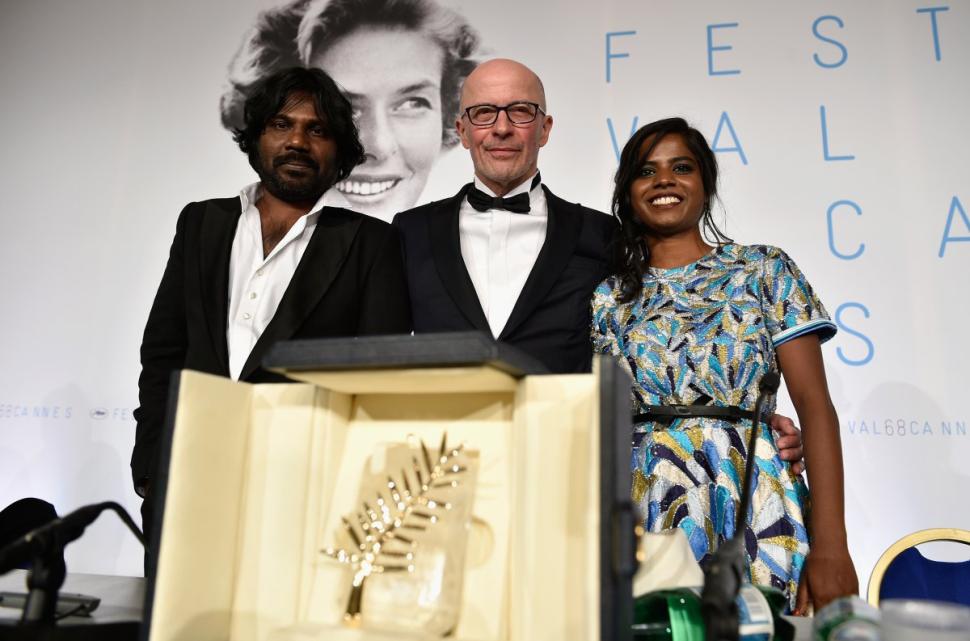Tamil Arrives in Cannes Via France
At the closing night awards ceremony director Jacques Audiard (C) with actors Jesuthasan Antonythasa

CANNES: It was strange to find for the first time that the language that ruled the press conference for the French film, Jacques Audiard’s “Dheepan” (which finally won the Palme d’Or), was mainly Tamil.
The film’s two lead actors, in roles that carry the thrust of the film, are required to speak in Tamil. The protagonist, Dheepan, is played by Sri Lankan actor Antonythasan Jesuthasan, now based in France. Chennai-based theatre actress Kalieaswari Srinivasan is Yalini, the female lead. Since questions posed related to their roles, the answers between them were in Tamil with an on-going French translation. Well-known director Audiard seemed happy to let his actors take the lead even with the media.
Giving the Palme d’Or to “Dheepan” was unexpected. But, from the start, many felt that not only was it well deserved, it served as a pointer to seeing cinema not in its glamour-ridden, readily accessible content but in the dark reality of the subterranean world of today that we know little about.
Post the Un Certain Regard awards ceremony director Neeraj Ghaywan of “Masaan”
The film looks at the aftermath of the internecine war in the sub-continent countries of Sri Lanka and India. It sees this confrontation as a freak human tragedy for hapless, endangered refugees forced to flee to an unknown country. Here, they face new compounded challenges. As illegal entrants, they live faceless, surreptitious lives. They have to adjust to a hostile culture and language. Even worse, they are at the mercy of gangster face-offs, in which they are pawns. Their fragile lives are at risk yet again and in other dreadful ways.
With all this, it is clear that director Audiard’s film is not about immigrants, internal wars or social housing. He says these elements are just “wall-paper”. He sees his film as a love story of how extraordinary the human spirit can be when it comes to forging relationships under adverse conditions. Sri Lankan actor Jesuthasan, a former LTTE fighter himself, fled his country at the age of 16, first to Thailand and then to Paris. He is a respected poet and writer in Tamil. Making his debut in this major lead role and film, he gives an outstanding performance as a quiet, disturbed but inspiringly committed humanist in a world of terror-stricken violence.
The film is about a disillusioned Tamil Tiger fighter called Dheepan who wants to flee the country. Families are given first preference to escape. A young woman, Yalini, confronts him with a motherless nine-year old girl and the three strangers pose as a family. In Paris, he lands a job as a caretaker in a crime-ridden outer suburb. Initially at odds, the three settle down to an uneasy camaraderie. Gentle loner Dheepan begins to like Yalini and the daughter yearns for her affection. But Yalini is hell bent on leaving them and going to a relative in London. Her attempts fail. She becomes a target of neighbouring warring gangsters. Dheepan, on a dare-devil mission, uses the skills he learnt as a LTTE fighter to save her and with that, bond his new family. Even while Jacques Audiard places his story in the canvas of a thriller, this tender story is full of cultural insights of alien countries and specially that of Tamil origin.
The Grand Prix Award drew the loudest applause when it went to Hungarian filmmaker Laszlo Nemes’s “Son of Saul”. This remarkable debut film details the harrowing conditions under which the Nazis kept Hungarian Jews as prisoners in their dreaded Auschwitz death camps. Their inhumanity and brutality is presented as routine daily rituals. Here, one stone-faced man with piercing eyes, while clearing dead bodies recognises one among them as his son. He then doggedly and with a suicidal zeal, spends the rest of the day and night in trying to give the boy a burial with a Rabbi saying the death prayers.
2015 Cannes, with its less marquee titles and glamour parade has met with a good response. The awards too are well received. India has come out from under its prolonged shadow on the international film scene with Neeraj Ghaywan’s “Masaan” winning two major prizes: the Un Certain Regard’s most promising film, and the FIPRESCI Award for Best Film in Un Certain Regard. Then, creating a record, was the second Indian film, Gurvinder Singh's "Chauthi Koot", also well received, To top that, Indian talent has been feted and discovered in Chennai actress Kalieaswari Srinivasan for her role in the ultimate honour, a Palme d’Or winning film.
Award Winners
Palme d'Or Jacques Audiard’s "Dheepan" (France)
Grand Prix Laszlo Nemes’ "Son of Saul" (Hungary)
Best Director Hou Hsiao-Hsien’s "The Assassin" (Taiwan, China, Hong Kong, France)
Best Screenplay "Chronic" Written by Michel Franco (Mexico)
Camera d'Or (Best First Feature) Cesar Acevedo’s "La Tierra y la Sombre" (Colombia, France, Netherlands, Chile, Brazil)
Jury Prize Yorgos Lanthimos’ "The Lobster" (Ireland, UK, France, Greece, Netherlands)
Best Actress Rooney Mara for "Carol" directed by Todd Haynes (UK, USA) and Emmanuelle Bercot for "Mon Roi" directed by Ma?wenn (France) (Shared Prize)
Best Actor Vincent Lindon for "The Measure of a Man" (France)
Palme d'Or (Short Film): Ely Daghe’s "Waves '98" (Lebanon, Qatar)



